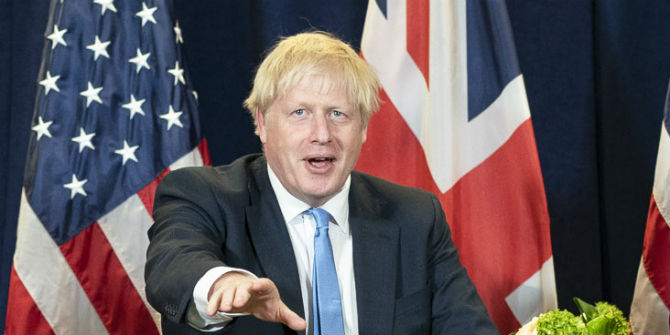LSE Brexit asked some of our academics to predict what kind of Brexit we can expect in 2020. Dimitri Zenghelis (LSE) says we should expect plenty of brinkmanship and subsequent climbdowns from a PM who knows he can get away with them.
Britain will leave the European Union at the end of January 2020 and the next day nothing much will change. Trade and free movement of people between Britain and the EU will continue unencumbered. The UK will find itself in the much-contested transition period – out of the EU, yet subject to its rules without influence on how they are set. This is not a comfortable place for any Prime Minister, let alone one who campaigned on leaving the EU to ‘take back control’. Perhaps unsurprisingly, therefore, one of Johnson’s first acts in the new parliament was to enshrine into the withdrawal bill the legal requirement to clinch a trade deal with the EU by the end of the year.

But Johnson, by his own account, has no deep ideological commitment to a hard Brexit. A tough stance will head-off cries of ‘vassalage’ from the Brexit party, but with a comfortable majority in parliament and a clear electoral mandate to leave the EU, these are nice-to-haves rather than binding constraints. If Johnson has one ideological commitment, it is to the dogmatic pursuit of his own political career. But this creates a tension. A deal struck in a matter of months would at best amount to a bare bones agreement, offering only restricted access to EU markets with compromises over fisheries and minimum standards. Loss of trade supply lines will most severely impact the Tory constituencies in the Midlands and North, newly won after toppling Labour’s historically indestructible ‘red-wall’. These regions are more dependent on EU trade and investment than London, where the red wall stood firm, and whose economy is the UK’s most integrated into the broader global economy.
If the right deal and the avoidance of unnecessary electoral pain requires more months of negotiation, as former UK Permanent Representative to the EU Sir Ivan Rogers has argued, then the transition will be extended. As with the withdrawal agreement, episodes of brinkmanship and bravado threatening no deal will be routinely followed by compromise and climbdown. Far from being the year of ‘getting Brexit done’ and ‘moving on’, 2020 is more likely to be remembered for more of the same.
This post represents the views of the author and not those of the Brexit blog, nor LSE.







Not certain that anything that Boris Johnson has done, or will be doing, ensures that the UK will ‘Clinch’ a deal. All of the rhetoric is about what the UK wants, and thinks it can force the EU to accept, but that is not the reality on the EU side. It will push for what is best for the EU, and does not accept that the UK is so important economically, politically, culturally or strategically that it, the UK, should dictate to the EU.
Sir Ivan Rogers’s views on the complexity of Brexit, and British naivety, are well worth studying in depth. However the big problem is that the right wing of the Conservative Party is now in charge, and driving Johnson towards the cliff edge.
One also notes the many paradoxes in the whole Brexit process. Both Sir Ivan Rogers and Boris Johnson are “Balliol men”. Both Ursula von der Leyen and Boris Johnson attended the European School in Brussels.